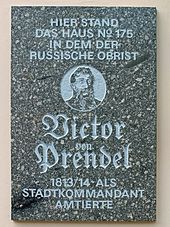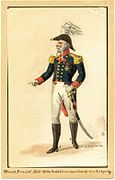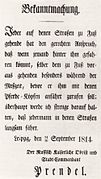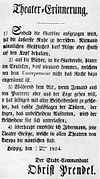Victor of Prendel
Victor Anton Franz von Prendel (* 1766 in Salurn , Tyrol , today South Tyrol , † October 29, 1852 in Kiev ) was an Austro-Russian general .
Life
Victor Anton Franz von Prendel comes from a not rich, but old Tyrolean noble family. He never used his title of nobility himself. He received his school education in a monastery of the Benedictine order. In addition to history, geography and theology, it was primarily languages that the linguist took with him from his training. He learned Latin, Italian, French and Hungarian and later also spoke Russian, Polish and English.
At the age of 15 he left the convent school and the spiritual career that was intended for him and started working in a bank in Venice . Together with the banker's son, Prendel was soon sent across Europe as a business agent. But he turned down the prospect of a career by marrying into the bank, because his mind was on the military.
In 1788 he entered the service of the Austrian army. Here he was to be found in various associations, such as the Tyrolean snipers and the "Uhlan Regiment Fürst Schwarzenberg" , which was commanded by Prince Liechtenstein . In the Austrian army he fought in the first two coalition wars . He was also captured but was able to escape France.
In the fighting he was more and more enthusiastic about the Russian Cossack units. Finally, in 1804, he quit his service with the Austrian Hussar Regiment No. 7 - he had meanwhile been Rittmeister - and joined the Imperial Russian Army . Here he led hussar and cossack units in partisan tasks and took part in almost all major battles up to 1812. B. also at the battle of Austerlitz , where he particularly distinguished himself. In between he was deployed on various diplomatic missions, during which he traveled all over Europe.
Returning from such a trip, he intervened in the battle against Napoleon at the Battle of Smolensk , then served under General von Wintzingerode and was promoted to colonel . When Napoleon was expelled from Russia, Prendel came to Saxony with a Cossack partisan unit and took part in various skirmishes up to the Battle of Leipzig.
After the Battle of Nations, Tsar Alexander appointed Colonel von Prendel as city commandant of Leipzig. In his one year activity here he led the city out of the military chaos back to (almost) normal civil life. From 1816 he organized the repatriation of Russian troops from the Altenburg area and was director of the military hospitals in Germany.
In 1819 he returned to Russia and took on special tasks in the headquarters of the 1st Army in Kiev under General Osten-Sacken . After a special assignment in Galicia , he was promoted to major general in 1831 , retired from the army in 1835 and retired.
Prendel was married to Anna Julia Victorie Eva, b. Petzold von Woitsdorf, and had two sons and a daughter.
City Commandant of Leipzig
On October 21, 1813, two days after the allies had taken the city in the Battle of the Nations near Leipzig, Colonel Victor von Prendel was appointed city commander. He was faced with the difficult task of bringing the city back to normal life. The numerous dead had to be buried, hospitals had to be set up for the masses of wounded, food to be procured and cultural life to be rebuilt.
He solved the problems with the necessary severity, but also with almost fatherly care. Its merits lay in the unbureaucratic mediation between soldiers and citizens as well as the military and civil administration. His numerous posted "announcements" in plain language, with which he addressed the people of Leipzig and which on the one hand related to military matters such as hospital services, troop moves or billeting, and on the other hand to civil life, became famous. His peculiarity was that he often wanted to regulate everything down to the smallest detail, sometimes overshooting the mark. But the people of Leipzig loved him because of his sometimes bizarre manner, his notices soon became a popular collector's item, and after his replacement on November 10, 1814, the city council granted him honorary citizenship.
On the orders of the King of Prussia, his successor was the Prussian Major General von Bismarck, who held command until June 15, 1815, until the return of the Saxon King from Prussian captivity. Prendel had stayed in Leipzig and, after Bismarck's departure, took over the command of imperial Russian affairs again until November 1815.
For his work in Leipzig he received numerous awards (see below), including the Commander's Cross of the French Legion of Honor for the good treatment of the captured and wounded French, who were the enemy.
Honors
- Order of St. Vladimir 4th class (1805 and 1813)
- Order of St. Anna 2nd class (1813)
- Swedish Order of the Sword 2nd Class for a military action on the Elbe near Torgau (1813)
- Prussian Order of the Red Eagle
- Commander's Cross of the French Legion of Honor for good treatment of the captured and wounded French
- Saxon commander's cross "for civil merit" for maintaining order and calm in Leipzig
- Bavarian Commander's Cross pour le mérite for taking care of the wounded and sick
- Commander of the Weimar Falcon Order (1819)
- "Honorary citizenship" of the city of Leipzig (1814, before the introduction of honorary citizenship in the Kingdom of Saxony)
- Honorary citizen of the city of Altenburg
- Order of St. George 4th Class (1828)
- Street naming in Leipzig- Gohlis (1898); the Prendelstraße in 1930 in Karl-Rothe environmentally -Straße, 1933 but again changed back into Prendelstraße until it was renamed in May 1945, again in Karl-Rothe-Straße - done in return in August 1945, the renaming of the Monument Avenue in Leipzig Stötteritz in Kommandant-Prendel-Allee
Commander Prendel Order
In 2015, the Kultur- und Umweltstiftung der Sparkasse Leipzig endowed the Commander Prendel Order. The order commemorates the work of Victor Anton Franz von Prendel as the city commander of Leipzig after the Battle of Nations in 1813 and is dedicated to men and women who have been continuously volunteering in national and international associations in the Leipzig region for many years to bring the Battle of Nations into a livelier one To keep memory, forgive.
The medal is awarded in two stages: the Commander Prendel Cross and the Commander Prendel Medal. The chapter of the order decides on the choice of the order bearers, which consists of the bearers of the Kommandant-Prendel-Kreuz, the board of the cultural and environmental foundation Leipziger Land of the Sparkasse Leipzig and the head of the order chancellery.
The award of the order takes place annually near the 18th and 19th October, the historic days of the Battle of the Nations near Leipzig.
literature
- Erhard Hexelschneider: Prendel, Victor Anton Franz von . In: Institute for Saxon History and Folklore (Ed.): Saxon Biography .
- Peter Broucek : Prendel Viktor Anton Franz. In: Austrian Biographical Lexicon 1815–1950 (ÖBL). Volume 8, Verlag der Österreichischen Akademie der Wissenschaften, Vienna 1983, ISBN 3-7001-0187-2 , p. 263 f. (Direct links on p. 263 , p. 264 ).
- Günter Latsch (Ed.): Victor Prendel. An original from the time of the Wars of Liberation. Kulturdirektion Leipzig 1987, with contributions by Gustav Wustmann and Peter Sakowitsch.
Web links
Individual evidence
- ↑ Gustav Wustmann: An original from the Wars of Liberation . In: Günter Latsch (Ed.): Victor Prendel ... , p. 47
- ↑ Erhard Hexelschneider: Prendel, Victor Anton Franz von . In: Institute for Saxon History and Folklore (Ed.): Saxon Biography .
- ↑ Gina Klank; Gernot Griebsch: Lexicon of Leipzig street names. Verlag im Wissenschaftszentrum Leipzig, Leipzig 1995, ISBN 3-930433-09-5 , pp. 118, 126
- ↑ Commander Prendel Order. (No longer available online.) Archived from the original on April 7, 2016 ; Retrieved April 7, 2016 .
- ^ Statutes of the Commander Prendel Order. (No longer available online.) Archived from the original on April 7, 2016 ; Retrieved April 7, 2016 .
| personal data | |
|---|---|
| SURNAME | Prendel, Victor of |
| ALTERNATIVE NAMES | Prendel, Viktor Anton Franz von; Прендель, Виктор Антонович |
| BRIEF DESCRIPTION | Austro-Russian officer and city commander of Leipzig |
| DATE OF BIRTH | 1766 |
| PLACE OF BIRTH | Salurn , Tyrol |
| DATE OF DEATH | October 29, 1852 |
| Place of death | Kiev |






